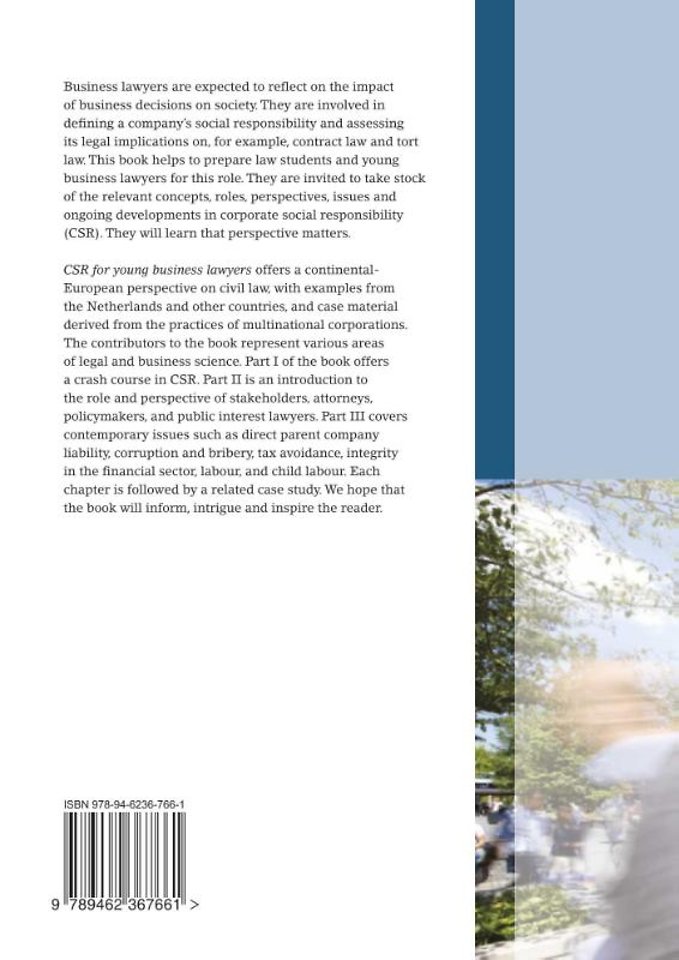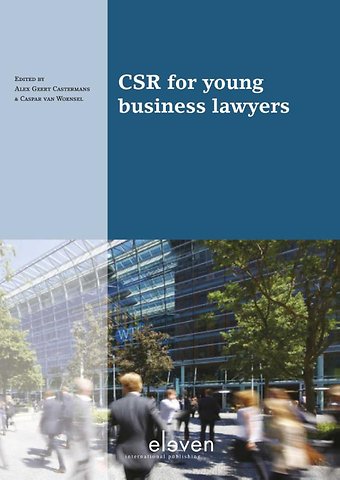



A.G. Castermans is hoogleraar burgerlijk recht aan de Universiteit Leiden.
Meer over de auteursCSR for young business lawyers
Paperback Engels 2017 1e druk 9789462367661Samenvatting
Business lawyers are expected to reflect on the impact of business decisions on society. They are involved in defining a company’s social responsibility and assessing its legal implications on, for example, contract law and tort law. This book helps to prepare law students and young business lawyers for this role. They are invited to take stock of the relevant concepts, roles, perspectives, issues and ongoing developments in corporate social responsibility (CSR). They will learn that perspective matters.
CSR for young business lawyers offers a continental-European perspective on civil law, with examples from the Netherlands and other countries, and case material derived from the practices of multinational corporations. The contributors to the book represent various areas of legal and business science. Part I of the book offers a crash course in CSR. Part II is an introduction to the role and perspective of stakeholders, attorneys, policymakers, and public interest lawyers. Part III covers contemporary issues such as direct parent company liability, corruption and bribery, tax avoidance, integrity in the financial sector, labour, and child labour. Each chapter is followed by a related case study. We hope that the book will inform, intrigue and inspire the reader.
Specificaties
Lezersrecensies
Over Caspar van Woensel
Inhoudsopgave
I THEORY 21
1 Explaining CSR 23
Alex Geert Castermans, Morshed Mannan & Caspar van Woensel
1.1 Multatuli 23
1.2 Van Marken 25
1.3 Early examples of CSR 27
1.4 What do the early examples have in common 28
1.5 Critical thinking on voluntary, social responsibility 30
1.6 Regional context: the European view 32
1.7 Making the right decision 36
1.8 Consideration of a multitude of perspectives 37
1.9 Global activism: a movement 39
1.10 Global corporate citizenship 40
1.11 Core questions of CSR 42
2 Business, society and stakeholders 59
Morshed Mannan, René Orij & Caspar van Woensel
2.1 Introduction 59
2.2 Business and its stakeholders 61
2.2.1 Searching for stakeholders 61
2.2.2 Locating stakeholders in a system 62
2.3 The case of coltan 63
2.4 Real-life applications of stakeholder theory 67
2.5 Using stakeholder theory as an analytical tool 68
2.6 Applying analytical tools to the case of coltan 70
2.7 Cultural issues and stakeholders 73
2.8 Conclusion 75
3 The framework of CSR 85
Caspar van Woensel
3.1 Introduction 85
3.2 Background to the framework 86
3.3 International CSR framework 88
3.3.1 People, planet, profit 88
3.3.2 UN Guiding Principles 89
3.3.3 UN Global Compact 90
3.3.4 OECD Guidelines for Multinational Enterprises 91
3.3.5 ILO Tri-partite Declaration of Principles Concerning Multinational Enterprises and Social Policy 94
3.3.6 The Equator Principles 94
3.3.7 ISO 26000 Guidance Standard 95
3.4 Position of the European Commission 96
3.5 Self-regulation through codes of conduct 97
3.6 Obligations of companies under Dutch private law 99
3.6.1 Company law 99
3.6.2 Tort law 101
3.6.3 Contract law 102
3.6.4 Criminal law 103
3.7 Ongoing developments 103
3.8 Final remarks 105
4 CSR in contracts 109
Alex Geert Castermans & Bénédicte Fauvarque Cosson
4.1 Introduction 109
4.2 Combating climate change with contractual clauses 110
4.3 Climate change: the new transnational legal order 112
4.4 Combating climate change by contractual clauses 122
4.4.1 A paradox 122
4.4.2 Voluntarily and yet legally bound: solving the paradox 123
4.4.3 Compliance with voluntary commitments: how unilateral commitments become legally binding 125
Unilateral acts legally binding without acceptance 125
Sustainability clauses 126
Customs and usages 129
4.5 Climate change: a role for the Unidroit Principles of international commercial contracts 131
4.5.1 The Unidroit Principles: general rules for international commercial contracts 131
4.5.2 Using the Unidroit Principles to give effect to parties’ representations and commitments 132
4.5.3 Good faith and inconsistent behaviour 132
Implied obligations 133
Quality of performance 134
4.6 Concluding remarks 135
II ROLES AND PERSPECTIVES 143
5 Shareholders’ role regarding CSR 145
Morshed Mannan
5.1 Introduction 145
5.2 A taxonomy of shareholder types and interests 146
5.3 The rise of the shareholder activist 150
5.4 Shareholder mechanisms to shape corporate behaviour 155
5.4.1 Shareholder activism for social responsibility: the US example 157
5.5 Conclusion and considerations for future business lawyers 164
6 The zealous advocate: nexus in a CSR-network 171
Alex Geert Castermans
6.1 Lawyers and the rule of law 171
6.2 A law firm’s CSR policy 172
6.3 Independent, without conflicts of interests 174
6.4 Taking into account the CSR policy of clients 177
6.5 Your wish is my command? 178
6.6 Coordinating CSR policies 180
7 The love–hate relationship between lawmaking and CSR policy 187
Mark Reichwein & Jan van Wijngaarden
7.1 Introduction 187
7.2 Governments’ interest in CSR 188
7.3 CSR and the role of government 189
7.4 International CSR and the global governance gap 193
7.4.1 National CSR 193
7.4.2 International CSR 193
7.5 Examples of CSR policy 197
7.5.1 CSR covenants 197
7.5.2 Public–private partnerships 199
7.5.3 International trade agreements 200
7.5.4 Legislation on reporting 201
7.5.5 Potential French due diligence regulation 202
7.5.6 A worldwide binding instrument for business and human rights 203
7.6 Conclusion 205
8 CSR from the perspective of a public interest law
organization 209
Filip Gregor & Paige Marrow
8.1 Introduction 209
8.2 The purpose of the corporation 211
8.2.1 Background 211
8.2.2 Ongoing developments 214
Policy makers’ response 214
Critical voices 216
Business response 217
8.2.3 Suggested takeaways for lawyers 218
8.3 Corporate responsibility for impacts on society 219
8.3.1 Background 219
8.3.2 The human rights due diligence concept 221
8.3.3 Ongoing developments 222
Sectoral initiatives 222
Non-financial reporting 223
Civil liability and duty of care 224
Alleviating obstacles to access to justice 224
8.3.4 Suggested takeaways for lawyers 225
III GREAT DEBATES 233
9 Direct parent company liability 235
Bastiaan Pries
9.1 Introduction 235
9.2 CSR Ltd v. Wren 235
9.3 Co-extensive duty of care 237
9.4 CSR Ltd v. Young 239
9.5 Chandler v. Cape plc 240
9.6 Conclusion on case law: it takes a perfect storm to find direct parent company liability 241
9.7 First legislative development: introduction of a duty of vigilance in France 242
9.8 Second legislative development: the Ecuador resolution 246
9.9 Conclusion on legislative developments: half-way solutions at best 247
9.10 What to do: actions for consideration 247
10 Corruption and bribery 255
Kim Tabell & Ingeborg Kuyvenhoven
10.1 Introduction 255
10.2 Definitions of corruption 259
10.2.1 Definitions in dictionaries 259
10.2.2 Definitions under ‘soft law’ and conventions 261
10.2.3 Meaning under national legal frameworks 263
10.2.4 Foreign Corrupt Practices Act 264
10.2.5 UK Bribery Act 264
10.2.6 Summarizing the definitions 265
10.3 Political regimes and corporate conduct 266
10.3.1 Where does the wealth flow? 266
10.3.2 Providers and incentives 267
10.3.3 Corporate context 268
10.3.4 Personal traits of executives 268
10.3.5 Setting the tone from the top 268
10.4 In-house counsel to facilitate the company and stakeholder 269
10.4.1 Increased and deeper responsibility for the good of society 269
10.4.2 Adequate procedures 270
10.4.3 Role of in-house lawyers 272
10.5 How in-house counsel can help to prevent corruption: a Kurdish
example 273
10.5.1 Operating in international petroleum regimes 273
10.5.2 The Kurdish context 275
10.5.3 Procurement processes 276
10.5.4 Engaging local communities within the parameters of an ABC regime 277
10.5.5 Using ‘soft law’: a sustainable approach to tackling bribery and corruption 278
10.6 Conclusion 281
11 The relationship between CSR and tax avoidance 287
Tanja Bender & Dirk Broekhuijsen
11.1 Introduction 287
11.2 Legal versus illegal ways to reducing taxes 289
11.3 The context and stakeholders of tax dilemmas 290
11.3.1 Tax law as a rule-focused, behaviour-steering, nonharmonized area of the law 290
11.3.2 Corporate governance codes and tax codes of conduct 292
11.3.3 Stakeholders and actors 295
Stakeholders inside the MNE 295
Customers and other outside actors 295
Governments making and implementing the tax rules 296
11.4 CSR and tax avoidance 297
11.5 Types of tax issues and the factors that could play a role in CSR decisions 298
11.6 Some high-profile cases 306
11.7 Adjustment of the rules – the OECD’s BEPS project and other future developments 308
11.8 Concluding remarks 310
12 Integrity in the financial sector 323
Valentina Caria
12.1 CSR for the banking sector: an overview 323
12.1.1 Introduction and scope of the chapter 323
12.1.2 What are financial institutions? 324
12.1.3 CSR for the banking sector 325
12.1.4 Integrity in the banking sector 326
Integrity 326
Definitions of integrity for the banking sector 326
12.2 Initiatives of the legislature 327
12.2.1 Remuneration policy 327
Introduction 327
The European perspective: CRD III and CRD IV 328
The Dutch perspective: a lower bonus cap 329
The bonus cap and integrity 329
12.2.2 An oath for the banking sector: an initiative of the
legislature and self-regulation 330
Introduction 330
The oath: affirmation and consequences 330
The oath and integrity 331
12.2.3 Integrity and the Money Laundering Directives:
customer due diligence 332
Introduction 332
Definition of integrity in the Third and Fourth Money Laundering Directive and the Dutch Financial Supervision Act 332
Dutch case law: integrity or right to a bank account? 333
Conclusion 334
12.3 Definitions of integrity: the view of the banking sector 334
12.3.1 Various definitions of integrity in Codes of Conduct 334
12.3.2 The Dutch Association of Banks and integrity 341
The Social Charter 341
The Culture Card Financial Sector 342
12.4 Conclusion 342
13 Labour – in search of socially sustainable globalization 357
Klara Boonstra
13.1 Introduction 357
13.2 Company-based initiatives 358
13.3 Association with transnational private regulation 360
13.4 Multinational companies as subjects of domestic and
international labour law 363
13.5 Methods to connect MNCs to an ILO standard 366
13.6 What is needed in a special convention for MNCs’ supply chains? 366
13.7 Application of the ILO supervisory mechanism 368
13.8 Conclusion 368
14 Eliminating child labour in the cocoa sector, with a focus on Ghana and Côte d’Ivoire 377
Maryse Hazelzet
14.1 Introduction 377
14.2 The legal framework governing child labour 381
14.2.1 The elimination of child labour 381
14.2.2 A holistic approach to the elimination of child labour 382
14.3 Implementing the elimination of child labour 385
14.3.1 The responsibility of the state 385
14.3.2 The responsibility of the company 385
14.4 Underlying challenges to the elimination of child labour 387
14.4.1 Governance gaps 388
14.4.2 A fragmented supply chain 388
14.4.3 Poverty 390
14.4.4 Lack of education 391
14.4.5 Social and cultural conditions and practices 392
14.5 Current developments in the elimination of child labour in the cocoa sector in Ghana and Ivory Coast 392
14.5.1 Governance gaps 393
14.5.2 A fragmented supply chain 394
14.5.3 Poverty 394
14.5.4 Education 395
14.5.5 Social and cultural conditions and practices 396
14.6 Conclusion 397
Anderen die dit boek kochten, kochten ook
Rubrieken
- advisering
- algemeen management
- coaching en trainen
- communicatie en media
- economie
- financieel management
- inkoop en logistiek
- internet en social media
- it-management / ict
- juridisch
- leiderschap
- marketing
- mens en maatschappij
- non-profit
- ondernemen
- organisatiekunde
- personal finance
- personeelsmanagement
- persoonlijke effectiviteit
- projectmanagement
- psychologie
- reclame en verkoop
- strategisch management
- verandermanagement
- werk en loopbaan





